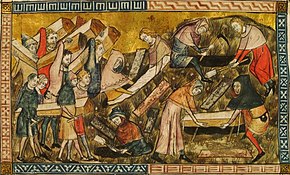
Image from Wikipedia
When the Black Plague hit Europe in 1350, it ravaged the area and killed millions of people, especially in the lower classes. But afterwards, the labor shortage caused a working class revival in the peasantry. Day laborers could demand more money for their goods and better working conditions. From the Medievalists:
After the ravages of the Black Death were finished in Europe, however, there were suddenly far fewer people to farm the lands. Egyptian scholar Ahmad Ibn Alī al-Maqrīzī, described what this looked like after the plague had passed through Egypt: “When the harvest time came, there remained only a very small number of ploughmen.” There were some who “attempted to hire workers, promising them half of the crop, but they could not find anyone to help them.” The same was true in Europe, and crops remained unharvested and great revenues were lost for the local landowners because they couldn’t get anyone to do the work.
Egyptian scholar Ahmad Ibn Alī al-Maqrīzī
Not surprisingly, some people didn’t like these uppity peasants not knowing their place.
Many and various attempts were made by local governments and officials to block this upward movement. An Ordinance from Castile in 1351 condemns those who “wander about idle and do not want to work” as well as those “demand such great prices and salaries and wages.” It orders all able to do so to work for a set, pre-plague price. Another from Sienna condemns those who “extort and receive great sums and salaries for the daily labor that they do every day” and sets a fixed price of six gold florins a year. …
The Medievalists
The English poet John Gower lamented in his Mirour de l’Omme that labourers who were used to eating bread made of corn now were able to eat that made of wheat and that those who had previously drunk water were now enjoying luxuries like milk and cheese. He also complained about their new, fancier attire, and their choice to dress above their station. His attitude was common among some in the upper and middle classes who lamented the social improvements of the lives of peasants and the loss of the good-old-days before the plague when the world was “well-ordered,” and people knew their place (as Gower says).
The similarities to today are interesting. While the COVID-19 pandemic didn’t kill nearly the same number of people (especially in the US), it did lead to a massive revolt in the working class. Now truck drivers for Walmart make $100K a year, and there are plenty of people wanting these modern day versions of “peasants” to remain in there place (typically by using mass illegal immigration and inflation to suppress wages). The hardest hit by far is the military, because it relies on a large number of cheap, easy to enlist, (mostly) men to fill its ranks. While it is somewhat of a stereotype (as analyzed in 2020), its not entirely false either.
Stuck between rising prices, a loss of patriotism, an increasingly smaller subset of the population it can recruit, the military is now in the same personnel crunch as 1370’s landlords. It even has its own versions of complaints against uppity peasants, which I call the “appeal to patriotism” and “suck it up,” and are best explained in an example.
A few years back, I sat on a panel discussing the manning problems related to a specific set of submarine Sailors. Because serving on submarines is voluntary, we didn’t have a lot of Sailors in one particular rating, and we had to put an OPHOLD on a Sailor. An OPHOLD basically means we canceled that Sailors orders to another duty station and kept them in their current job. It’s supposed to be a rare thing, so the fact that we had to do this to meet minimum manning was concerning.
On the panel I suggested that we authorize a special bonus for these Sailors of around $150 a month. While that doesn’t seem like a lot of money, I had seen bonuses of that size bump up volunteers before, and I figured we could easily raise it again in the future if needed. I had at least two civilians, both retired master chiefs, scoff at this notion. “These kids should be volunteering for submarine duty out of patriotism!” one said (yup, literally his words). Another lamented that kids these days couldn’t “take it” when it came to the hardships of submarine duty.
The senior most officer (a Captain) asked why we couldn’t just keep OPHOLDing Sailors. Frustrated, at this point I jumped in and said “Your OPHOLD means nothing if Sailors start saying they’ll commit suicide, which guarantees you can’t assign them to a submarine.” The room got pretty quiet, and eventually the Captain agreed we should pursue a bonus. Ultimately the bonus did help and got us out of the manning jam, although it took a while and put the Navy in a pretty risky position at the time.
If you wonder why I’m never surprised at the horrible conditions onboard the GEORGE WASHINGTON and why Sailors commit suicide, well, now you know. Retired senior enlisted and officers sitting in cushy desk jobs that feel their funding might get cut if they provide more morsels to our young Sailors doing the hard work are all too common in our force today. Sadly, this class of bureaucrat is so deeply entrenched I’m not sure the military will survive before they can be uprooted.
This post represents the views of the author and not those of the Department of Defense, Department of the Navy, or any other government agency.
